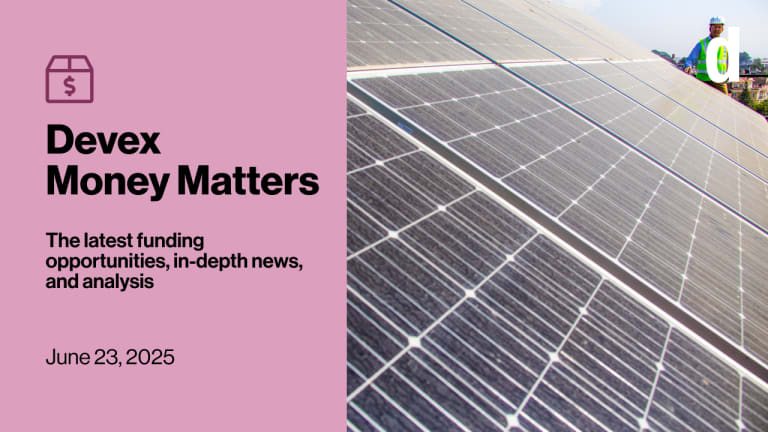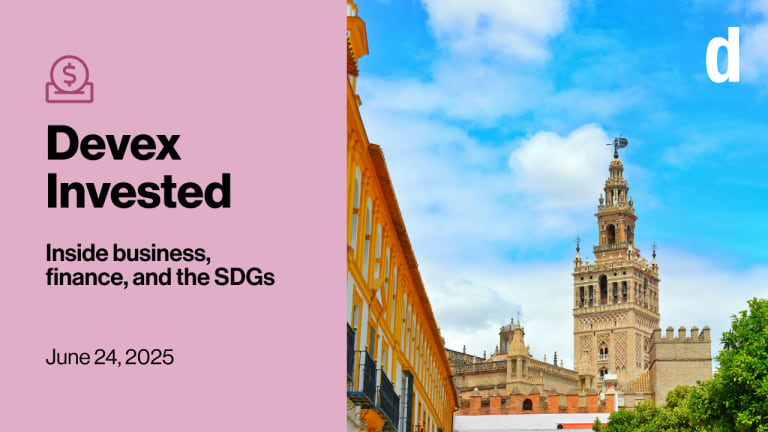
The Trump administration has pulled out of U.N. talks on financing development goals — and a major development finance summit — objecting to proposals for U.N.-led debt negotiations and increased development bank lending.
Also in today’s edition: What’s happening with the tax on foundations in Donald Trump’s “big, beautiful bill,” and a well-worn clash at climate finance negotiations in Bonn.
See you soon: Today at 10 a.m. ET (4 p.m. CET), as part of our Road to Sevilla series, we will be in conversation with Leslie Maasdorp, CEO of British International Investment, to discuss how DFIs are adapting investment approaches as geopolitical landscapes shift, which frameworks are successfully combining financial sustainability with development, and public-private approaches. Register now and submit your questions. If you can’t attend live, we’ll send you a recording!
Walkout
The Trump administration has pulled the United States out of the United Nations talks on a global pact to fund the Sustainable Development Goals at the Fourth International Conference on Financing for Development, or FfD4 — rejecting more development bank lending and accusing the U.N. of overstepping.
“The United States regrets that the text before us today does not offer a path to consensus,” said Jonathan Shrier, the U.S. representative at the talks, who added that the U.S. “withdraws from this preparatory process … and will not participate in FfD4 in Sevilla, Spain.”
The move was no surprise: The Trump administration has already withdrawn from the Paris Agreement, the U.N. Human Rights Council, and U.N. tax negotiations, while slashing funding to other agencies, writes Senior Global Reporter Colum Lynch.
At issue? A draft declaration that recommits to end poverty and hunger everywhere “leaving no one behind,” but which Washington said crossed red lines — especially a proposed U.N. role in debt negotiations and calls to triple lending by multilateral development banks. “The proposals that envision a role of the U.N. in the global debt architecture are unacceptable,” Shrier told delegates at the talks yesterday.
Despite the U.S. exit, the rest of the world moved ahead. “The FFd outcome is a good reflection of the state of multilateral cooperation,” Minh-thu Pham of Project Starling explained. “Basically, this outcome shows the resolve of the rest of the world to move forward with or without the U.S.”
Still, for others, the deal didn’t go far enough. “It needed to be more ambitious,” said Ishaan Shah of the Young Feminist Caucus. And some countries, such as New Zealand and Poland — representing Europe — were frustrated by watered-down climate language and new debt proposals.
Even so, the declaration was adopted — and for many, it marked a symbolic moment: A divided but determined global push toward development finance, minus the United States.
Read: US abandons Financing for Development Conference
Related op-ed: In Sevilla, we can deliver a game changer for development finance
Background: What is Financing for Development 4 and why is it a big deal? (Pro)
+ If you’re planning to be in Seville for FfD4, be sure to register to visit us at Casa Devex, where we’ll be hosting exclusive interviews and panels with development leaders at a Spanish villa between June 29 and July 1. Between sessions, Casa Devex will also serve as a hub for networking, meeting space, and local flavors. Sign up here.
The battle of Bonn
Tensions flared at the midyear U.N. climate talks in Bonn, Germany, this week, where negotiations kicked off with a 17-hour standoff over whether to include Article 9.1 of the Paris Agreement on the official agenda. The article concerns the provision of public finance from developed to developing countries.
The dispute came as no surprise after the fallout from last November’s COP29 climate conference in Baku, Azerbaijan, where developing countries denounced the $300 billion climate finance goal as a “paltry sum” and “not something that will enable conducive climate action,” in the words of India’s Chandni Raina.
Negotiators pushing for the inclusion of Article 9.1 likely didn’t expect unmitigated success, experts told my colleague Jesse Chase-Lubitz on the sidelines of the talks. “By proposing 9.1 they're not actually wanting to kind of have an agenda about 9.1,” said Jeffrey Qi, a policy adviser with the International Institute for Sustainable Development. “It's a way to continue to signal that we need another way to figure out developing country finance."
On Tuesday evening, minutes after the agenda was gaveled in, India’s Amandeep Garg slammed developed countries’ refusal to include the article as “totally and completely unacceptable.” He promised that India would bring it up again at COP30 later this year in Brazil, potentially spelling another delay at the annual climate meeting.
For now, developed countries have a footnote offering informal consultations instead of formal agenda space. But the impasse threatens to cast a shadow over COP30. “The can has officially been kicked down the road,” said Salomé Lehtman, advocacy adviser at Mercy Corps.
Read: Climate negotiations in Bonn begin with familiar finance clash
Background: Before COP30 takes the spotlight, Bonn sets the stage
Take it off the bill
President Donald Trump’s “big, beautiful bill” is back — but this time, the Senate Finance Committee has excluded a tax hike on foundations.
The bill – which is in line with a multitude of Trump's campaign promises – was passed by the House of Representatives last month. There were two provisions in that bill that affected the aid sector: A so-called nonprofit killer clause that would allow the secretary of the Treasury to strip an organization of its tax-exempt status if he deemed it to be supporting terrorists, and an increased excise tax on foundations’ net investment income.
The former provision was dropped from the bill, but the latter was retained. As a result, foundations were slated to see their excise tax — currently at 1.39% — rise to as much as 10% depending on their assets.
After passing in the House of Representatives, the bill headed to the Senate -– which created a version of the bill that struck the excise tax provision earlier this week. Now, the legislation will make its way to the Senate floor, and if it passes there, it will be reconciled with the House version before being sent to the president’s desk. But that process is unlikely to be a smooth one: The bill is packed with contentious domestic policy issues, and would raise the country's debt ceiling to as much as $5 trillion depending on which version wins out.
Further reading: Trump’s ‘big, beautiful bill’ clears key committee, hurting foundations
ICYMI: Trump’s signature tax proposal passes without ‘nonprofit killer’ clause
How’s business?
Palladium International — one of the U.K. Foreign, Commonwealth, and Development Office’s top contractors — testified before a parliamentary committee yesterday that while 80% of its business in the country comes from FCDO, it could still survive as an organization without its U.K. government work. Palladium, which Devex found was one of the contractors hardest hit by the U.S. aid cuts this year, has also seen its U.K. government contracts decline in line with that country’s aid cuts.
Palladium CEO Sinéad Magill apologized to another witness, nonprofit management professor Brendan Whitty, after he pointed out that Palladium had ignored an invitation to take part in a lengthy study he conducted on for-profit contractors working with FCDO. Committee chair Sarah Champion said at the hearing: “I look forward to this blossoming into a beautiful exchange of information.”
Read: Major for-profit contractor says FCDO business not key to its survival
Background: FCDO's top development contractors of 2023/24 (Pro)
Related: Who lost the most? The 20 USAID contractors hit hardest (Pro)
+ If you value our reporting, then join Devex Pro to get even more. You’ll get timely funding insights and insider reporting, members-only events and briefings, exclusive access to the stories and conversations shaping the future of global development — and you’ll help keep essential journalism open for others! Try it out today with a 15-day free trial, and check out some of the content exclusive to Pro readers.
When in doubt, innovate
Save the Children has appointed its first chief innovation officer, tapping longtime insider Maggie Korde to shake things up. After five years leading operations in Rwanda and Burundi, Korde is now tasked with scaling breakthrough ideas across the global NGO — and finding smarter, faster ways to support children in crisis, writes Natalie Donback for Devex.
In her new role, Korde will oversee four innovation units globally. Her lean team of four is diving into frugal innovation, exploring AI, and building a strategy from Nairobi, Kenya, now a pan-African innovation hub.
She’s already thinking about a “what works lab” — a space where tested ideas can be pitched to donors for mass rollout. “We’re only really scratching the surface of these interventions,” she says. “I’m excited to see how we can really expand those, replicate them, and bring them to scale.”
Read: Why Save the Children appointed its first chief innovation officer (Career)
+ If you haven’t yet, try out a Devex Career Account membership with a 15-day free trial and gain access to all our exclusive career insights and resources from top development professionals and the full global development job board.
In other news
At least 51 Palestinians were killed and more than 200 wounded in the Gaza Strip while waiting for food rations, according to Gaza’s Health Ministry and a local hospital. [AP]
The U.N. Geneva office has formally proposed to vacate the historic Palais Wilson by mid-2026 due to funding shortfalls partly triggered by Trump administration cuts, with the U.S. owing nearly $1.5 billion in arrears. [Reuters]
Private contracting firms led by former U.S. intelligence officers and military veterans are delivering aid in conflict zones including Gaza and South Sudan, alarming humanitarian groups. [The Independent]
Sign up to Newswire for an inside look at the biggest stories in global development.




